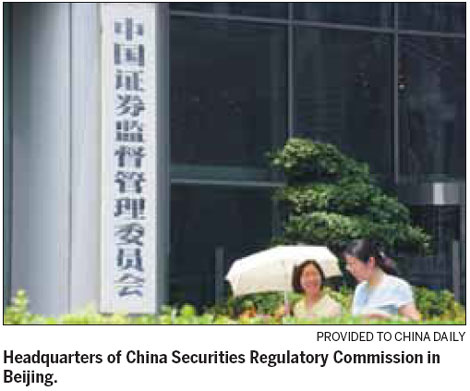More trial trading zones to help boost equity market

The State Council has approved the expansion of a pilot share-trading platform into three more development zones, in an effort to breathe life into China's tumbling stock indexes.
The new third board, as it is being called, is an over-the-counter equity trading system aimed to help emerging businesses shore up their finances, the China Securities Regulatory Commission said on Friday.
The new market is designed to be a platform for fledgling high-tech and growth enterprises.
The move comes as China's tumbling stock indexes have started to seriously affect investor confidence, already weakened by slowing macro-economic conditions, according to an unnamed official from the Commission.
"The mainland stock market has been falling since May, and many investors remain worried about the grim international financial situation, and how the deepening European debt crisis could mean a serious adverse effect for domestic economic growth," he said.
The Shanghai Composite Index has fallen 13 percent from the year's peak on March 2. On Friday, the market closed at 2132.80, a one percent increase on the day, and only 0.2 percent up on the week, after a six-week losing streak.
The stock gauge dropped to 2100.25 on July 31, reaching a three-year low as investors lost confidence.
The unnamed commission spokesman confirmed that the State Council had approved plans for expanding the new third board pilot into the Zhangjiang High-Tech Industrial Development Zone in Shanghai, East Lake High-Tech Development Zone in central China's city of Wuhan and the Tianjin Binhai High-Tech Industrial Development Area.
Figures show that in the first seven months of the year, just 122 companies issued IPOs, compared with 187 in the same period a year earlier.
New share issues raised 86.1 billion yuan ($13.51 billion) from January to July, a 53 percent year-on-year drop, according to data released by the CSRC.
"The market is the main force behind influencing IPO numbers and scale," said the CSRC official, pledging that more market-based share issuing system reforms are planned to help improve sentiment.
To boost the secondary market, the CSRC previously suspended IPO approval in 1995, 2001 and 2004. "But the effects were very limited," added the official.
"Now the average price-earning ratio of the mainland market has dropped to a historic low," he said.
According to CSRC data, the dynamic PE ratio of the A shares reached 12.72 times on Thursday, even lower than that on June 6, 2005, when the Shanghai Composite Index fell to 998.
In addition, the PE ratio of the country's blue chips is lower than most shares in overseas markets, reported the CSRC.
Meanwhile, blue-chip dividend yield ratios are relatively high in emerging countries.
Last year, the ratio of shares tracked by the CSI 300 Index was 2.35 percent, compared with 1.53 percent of the Indian SENSEX 30 Index and 2.11 percent on the Standard & Poor's 500 Index.
"That indicated that the long-term investment value of the country's stock market is increasing," the CSRC official said.
As well as the new third board pilots, the securities regulator is preparing to inject more money from qualified foreign institutional investors to boost the mainland market, a CSRC official from the fund management department said on Friday.
In the first half of this year, the total quota of The Qualified Foreign Institutional Investor had grown by $5.69 billion, of which the State Administration of Foreign Exchange had approved $4.43 billion for 36 new investors, while 10 existing QFII companies got $1.42 billion more from last year, the CSRC data showed.
At Friday's close, 147 foreign institutional investors had received the QFII quota of $28.53 billion, 123 of which have injected $21.3 billion into the mainland market, it said. In the first half year, the CSRC approved QFII licenses for 37 new companies.
On Thursday, the CSRC announced a cut in the transaction fees on share trading by 20 percent, a move expected to save investors 600 million yuan in the final four months of the year, a move which saw stock market increases on the day.
chenjia1@chinadaily.com.cn


















